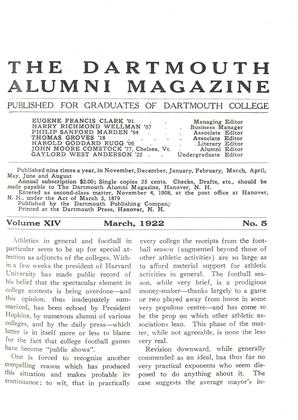The following is taken from a letter to Harry Wellman about his article in the last number of the magazine:
"Your suggestions comprised two ideas which are uniting to produce my own on the subject:— this is, by the way, biologically satisfactory! First, though, I want to say this about your own article: that were the Senior Class to be unified as you suggest, it would seem to me desirable to abolish the Freshman Commons, as this, taken with all the other lines, curricular and extra-curricular, between the Freshmen and the other undergraduates, tops off the demarcation between them. Unless some such adjustment were made, the college would consist of Sophomores and Juniors.
"The two ideas which I am snatching are these: that men working in the same department of instruction would benefit by living together in dormitories; and the development of an American version of the Oxford college. They produce this plan.
"Establish at Dartmouth three schools: a School of Languages and Literatures, a School of Mathematics and Natural Science, and a School of Social Science. Center the Language group in recitation halls and dormitories in the vicinity of Dartmouth Hall; the Natural Science group around Steele and Wilder Halls; and the Social Science group in new buildings on the Hitchcock estate. Each group would be an administrative unit, and would of course have its own dining hall. Then there would be an all-College Chapel, perhaps where Chandler and Crosby now are; an enlarged Webster Hall, which could be used as a place of assembly by the whole college; and a library to serve the whole College between Webster and the Chapel.. College Hall might continue to provide a meeting-place for the whole college.
The Faculty of each School would pay special attention to the students in their group; they would as well give specially adapted courses in their subjects to the students in the other schools so that all might have certain fundamental training in the principal fields of human endeavor. I might say here, too, that a man would upon entering college specify his choice of schools. He would have the privilege of changing his election at any time during his first year, with the consent of a central office of Vocational direction. If his progress at the end of the first year, or earlier, seemed unsatisfactory, and likely to remain so, he would be requested to leave college. And as for the last year, when it would be necessary to bring all the Seniors together in the interest of a strong Alumni spirit, that might be done by establishing some sort of a Senior Club; not an organization, however, which would take him too course, the degree which would be given would just be accomplishing his best work. And of course, the degree which would be given would be from Dartmouth College.
Certain advantages would arise in this plan, I believe. For one, there would be a distinct group inspiration which ought to result in a better grade of work. For another, any "renaissance of cultural college training" must probably be preceded by a closer contact between faculty and student; this would arise in the necessarily tutorial methods of such schools. Also, it might even be possible to take the intercollegiate athletics bull by the horns, and throw him, by substituting, intra-mural contests between the schools, with perhaps two or three games in any one sport with other colleges. It should also mean the doing away with compulsory commons, compulsory recreation, and all other compulsions, because, under an adequate admission system, each school would be a community of at least semi-intelligent spirits with common interests. It is only in such a group, I am convinced, that any growth of ideas can be achieved, or any true education gained.
Carnival on the Golf Links
 View Full Issue
View Full Issue
More From This Issue
-
 Article
ArticleCOLLEGE DISCIPLINE
March 1922 By EDWIN JULIUS BARTLETT '72 -
 Article
ArticleAthletics in general and football in particular seem to be up for special
March 1922 -
 Article
ArticleTHE COLLEGE GRANT
March 1922 By JOHN M. GILE '87 -
 Article
ArticlePRESIDENT HOPKINS EXPOSES "FUNDAMENTALIST" MOVEMENT
March 1922 -
 Article
ArticleTWELFTH WINTER CARNIVAL A HUGE SUCCESS
March 1922 -
 Sports
SportsBASKETBALL
March 1922








